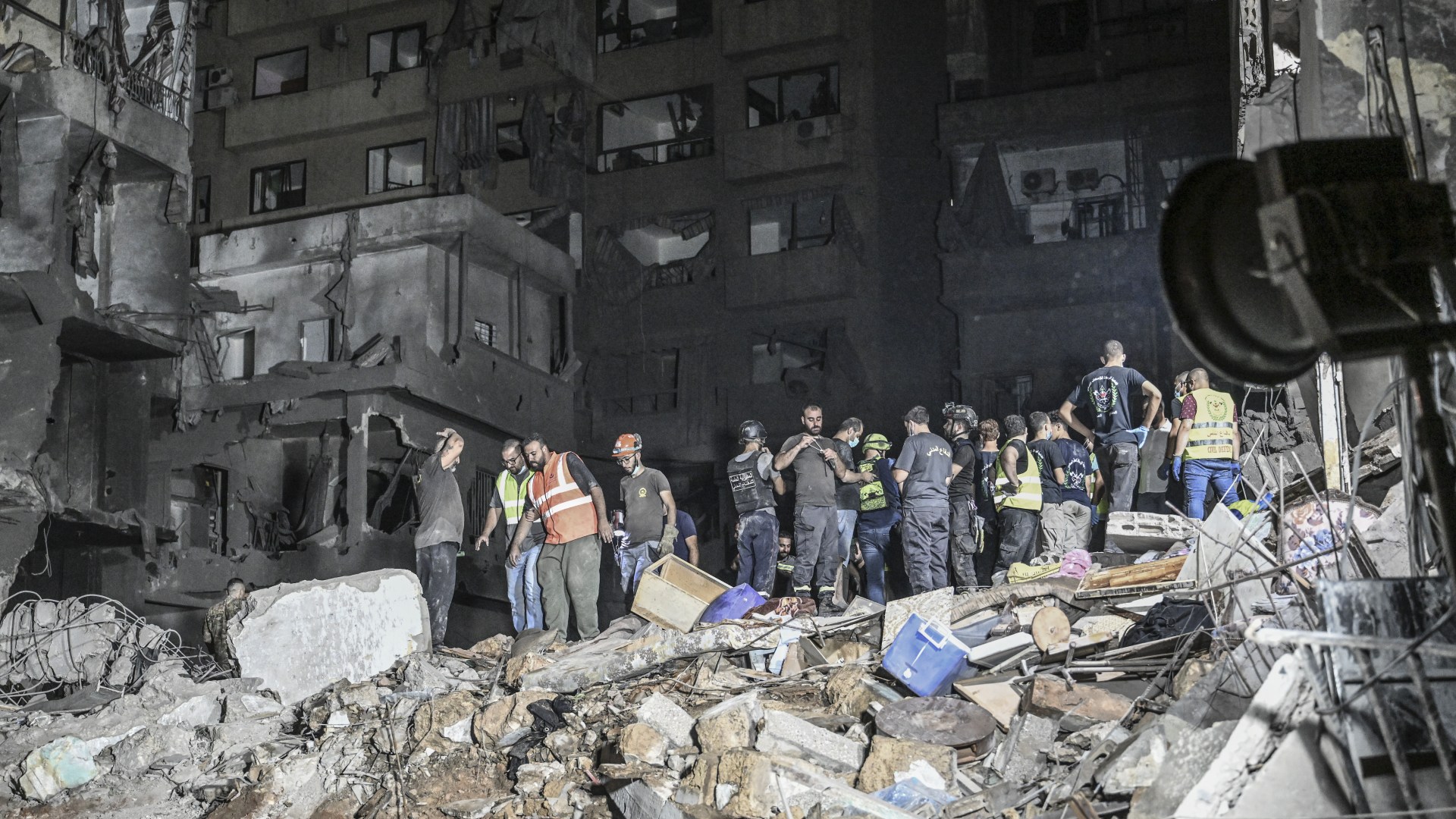Emergency In Beirut: Israeli Airstrike And Evacuation Order

Table of Contents
The Israeli Airstrike: Cause and Consequences
Reasons Cited by Israel
Israel has cited security concerns as the justification for the airstrike, claiming the targets were linked to Hezbollah, a Lebanese Shia Islamist political party and militant group. Official statements from the Israeli Defense Forces (IDF) have pointed to the alleged discovery of imminent threats emanating from these sites, claiming the strikes were necessary to prevent attacks against Israeli citizens. These statements, however, have been met with widespread international criticism, with many questioning the proportionality of the response and the targeting of civilian areas. Keywords like Israeli military action, security concerns, and Beirut conflict are central to understanding this complex situation.
- Specific targets: The airstrikes reportedly targeted several locations, including alleged Hezbollah weapons storage facilities and what Israel claims were command centers. The exact coordinates and nature of these targets remain contested.
- Casualties: The number of casualties remains uncertain, with conflicting reports emerging from various sources. Credible news organizations and humanitarian groups are working to verify the figures, though the initial reports suggest a significant loss of life and injuries among civilians.
- Damage to civilian infrastructure: The extent of the damage to civilian infrastructure, including homes, hospitals, and essential services, is substantial and continues to be assessed. The destruction of critical infrastructure further complicates the already dire Beirut emergency evacuation.
International Condemnation and Responses
The Israeli airstrike has drawn widespread international condemnation. The United Nations Security Council has issued statements expressing grave concern and calling for an immediate cessation of hostilities. Many countries have condemned the attack, emphasizing the need for a peaceful resolution and expressing solidarity with the people of Lebanon. The keywords international response, global condemnation, and diplomatic efforts highlight the global nature of this crisis.
- Statements: Key international figures, including the UN Secretary-General, have issued strong statements condemning the violence and urging restraint from all parties involved.
- Proposed resolutions: Efforts are underway to secure a UN Security Council resolution calling for an end to the violence and the establishment of a mechanism to investigate the incident.
- Humanitarian aid: Numerous countries have pledged humanitarian aid and assistance to support the Beirut emergency evacuation and address the immediate needs of the affected population.
The Beirut Emergency Evacuation: Current Situation
Evacuation Efforts and Challenges
The Beirut emergency evacuation is a massive undertaking, involving the coordination of multiple international and local organizations. Thousands of civilians are being evacuated from the affected areas, many seeking refuge in neighboring countries or safer locations within Lebanon. This refugee crisis requires a massive humanitarian response.
- Numbers evacuated: The number of people successfully evacuated varies across reporting agencies, and the true figure may not be available for some time.
- Evacuation routes: Designated evacuation routes are being established, though damaged infrastructure and security risks pose significant challenges.
- Challenges: The damaged infrastructure, ongoing security concerns, and lack of sufficient resources hamper the evacuation efforts.
- Organizations: The Red Cross, UN agencies, and various NGOs are playing a critical role in coordinating and supporting the evacuation.
Safety and Security Concerns
The security situation in Beirut remains volatile. Ongoing clashes and potential for further attacks present significant safety risks for those remaining in the city or attempting to evacuate. The keywords security risks, civil unrest, and personal safety highlight the precarious situation.
- Current security situation: The situation is highly fluid, with reports of ongoing clashes and uncertainty about the future.
- Advice for those remaining: Those who remain in Beirut are advised to stay informed about developments and follow instructions from local authorities.
- Travel advisories: Many governments have issued travel advisories warning against all non-essential travel to Lebanon.
Providing Aid and Support to Beirut
How to Help
Individuals around the world can contribute to the relief efforts through donations to reputable charities and organizations working on the ground. Keywords like donate to Beirut, humanitarian aid, and relief efforts are crucial for directing aid effectively.
- Credible charities: Organizations like the Red Cross, Doctors Without Borders, and other reputable international aid agencies are actively involved in providing relief. Donating to these well-established groups ensures funds are used effectively.
- Volunteer opportunities: While opportunities for on-the-ground volunteering may be limited due to the ongoing crisis, many organizations accept volunteers to support their efforts remotely.
- Spreading awareness: Raising awareness through social media and conversations can help garner broader support and pressure for appropriate responses from international bodies.
Long-Term Recovery and Reconstruction
The long-term recovery and reconstruction of Beirut will require sustained international support. The keywords Beirut reconstruction, long-term aid, and recovery efforts highlight the immense challenge ahead.
- Challenges: Rebuilding destroyed infrastructure, restoring essential services, and reviving the economy will be a protracted and complex process.
- International community: The international community will have a vital role to play in providing financial and technical assistance over many years.
Conclusion
The Beirut emergency evacuation is a tragic consequence of the devastating Israeli airstrike. The immediate need for humanitarian assistance is overwhelming, as is the long-term challenge of rebuilding a city scarred by conflict. The Beirut emergency evacuation requires a coordinated international effort to address the immediate humanitarian crisis and to support the long-term recovery and reconstruction of the city. Stay informed about the evolving Beirut emergency evacuation and consider how you can contribute to the relief efforts. Donate to reputable organizations, advocate for lasting peace, and help those impacted by this devastating crisis.

Featured Posts
-
 Khaznas Saudi Arabia Expansion A Post Silver Lake Investment Strategy
Apr 29, 2025
Khaznas Saudi Arabia Expansion A Post Silver Lake Investment Strategy
Apr 29, 2025 -
 Is Dysprosium The Next Big Bottleneck For Electric Vehicle Production
Apr 29, 2025
Is Dysprosium The Next Big Bottleneck For Electric Vehicle Production
Apr 29, 2025 -
 Did Trumps China Tariffs Cause Higher Prices And Shortages An Economic Assessment
Apr 29, 2025
Did Trumps China Tariffs Cause Higher Prices And Shortages An Economic Assessment
Apr 29, 2025 -
 High Stock Market Valuations Why Bof A Says Investors Shouldnt Worry
Apr 29, 2025
High Stock Market Valuations Why Bof A Says Investors Shouldnt Worry
Apr 29, 2025 -
 New Business Hot Spots A Map Of The Countrys Top Locations
Apr 29, 2025
New Business Hot Spots A Map Of The Countrys Top Locations
Apr 29, 2025
Latest Posts
-
 Norfolk States Diamond Johnson Earns Wnba Minnesota Lynx Camp Invitation
Apr 29, 2025
Norfolk States Diamond Johnson Earns Wnba Minnesota Lynx Camp Invitation
Apr 29, 2025 -
 Brazil Bound Justin Herbert And The Chargers 2025 Season Opener
Apr 29, 2025
Brazil Bound Justin Herbert And The Chargers 2025 Season Opener
Apr 29, 2025 -
 Chargers To Kick Off 2025 Season In Brazil Justin Herberts Role
Apr 29, 2025
Chargers To Kick Off 2025 Season In Brazil Justin Herberts Role
Apr 29, 2025 -
 April 27 2025 Nyt Spelling Bee Answers Hints And Pangram Solution
Apr 29, 2025
April 27 2025 Nyt Spelling Bee Answers Hints And Pangram Solution
Apr 29, 2025 -
 Open Thread February 16 2025 Latest News And Updates
Apr 29, 2025
Open Thread February 16 2025 Latest News And Updates
Apr 29, 2025
